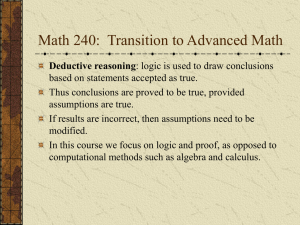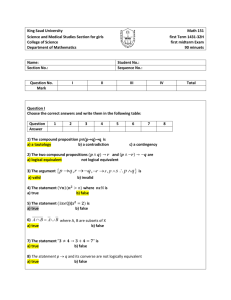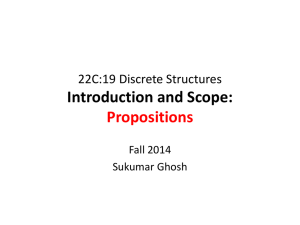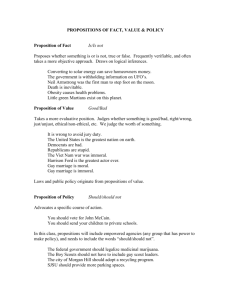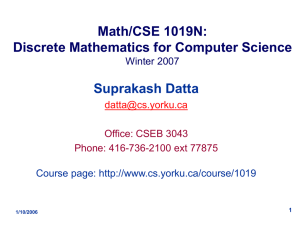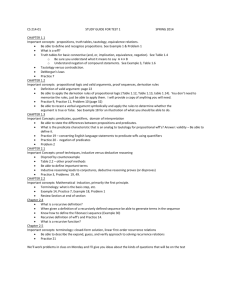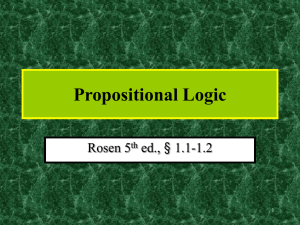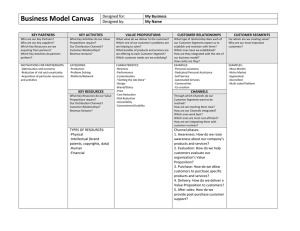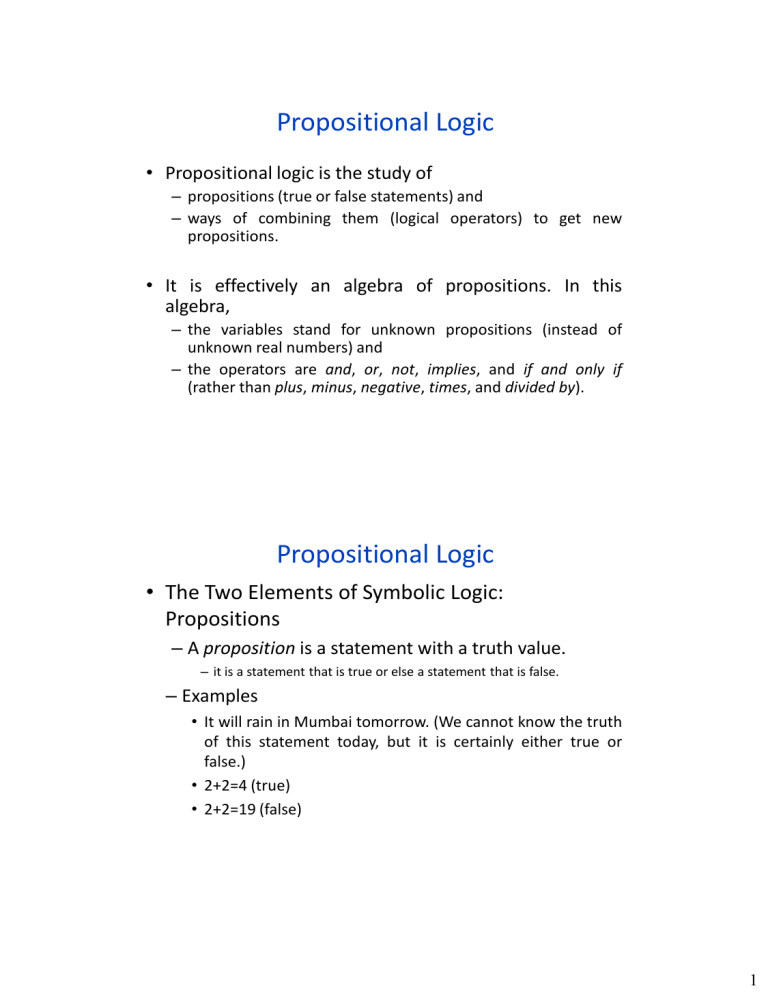
Propositional Logic • Propositional logic is the study of – propositions (true or false statements) and – ways of combining them (logical operators) to get new propositions. • It is effectively an algebra of propositions. In this algebra, – the variables stand for unknown propositions (instead of unknown real numbers) and – the operators are and, or, not, implies, and if and only if (rather than plus, minus, negative, times, and divided by). Propositional Logic • The Two Elements of Symbolic Logic: Propositions – A proposition is a statement with a truth value. – it is a statement that is true or else a statement that is false. – Examples • It will rain in Mumbai tomorrow. (We cannot know the truth of this statement today, but it is certainly either true or false.) • 2+2=4 (true) • 2+2=19 (false) 1 Propositional Logic • The Two Elements of Symbolic Logic: Propositions – On the other hand, here are some examples of expressions that are not propositions. – Examples • Blue is the best color to paint a house. (This is a matter of opinion, not truth. It may be your favorite color, but it is not objective truth.) • Coffee tastes better than tea. (Again, this is a matter of taste, not truth.) • The integer n is even. (Since n has no value, this statement is neither true nor false. If n is given a value, this statement becomes a proposition.) Propositional Logic • The Two Elements of Symbolic Logic: • Logical Operators – Arithmetic operators (operations) such as addition, subtraction, multiplication, division, and negation act on numbers to give new numbers. – Logical operators such conjunction (and), disjunction (or), and negation (not) act on propositions to give new (compound) propositions. 2 Propositional Logic • The Common Logical Operators – Conjunction (and): The conjunction of propositions p and q is the compound proposition “p and q”. We denote it p q . It is true if p and q are both true and false otherwise. Propositional Logic • The Common Logical Operators – The disjunction of propositions p and q is the compound proposition “p or q”. We denote it . It is true if p is true or q is true or both. p T T F F q T F T F pq T F F F 3 Propositional Logic • The Common Logical Operators – Negation (not): The negation of a proposition p is “not p”. We denote it . It is true if p false and vice versa. – it is a unary operator, acting on a single proposition rather than a pair (the others are binary operators). p ~p T F F T Propositional Logic • The Common Logical Operators: Conditional (implies, ifthen) – An implication is a compound proposition of the form “if p then q” or “p implies q”. – In English this phrase carries many meanings. – Sometimes it means that p causes q as in “if you eat too much you will get fat.” – Sometimes it means that p guarantees q and vice versa as in “if you write a book report, I will give you five points extra credit” (tacitly assuring you that if you do not write it, I certainly will not give you extra credit). – Sometimes it takes a very weak sense, simply asserting that the truth of p guarantees the truth of q as in “if you resign the chess game, you will lose” (but of course if you play on in a bad position, you will probably lose anyway continued play does not guarantee winning). 4 p q pq T T T T F F F T T F F T Propositional Logic • The Common Logical Operators: Biconditional (if and only if): – The biconditional of propositions p and q is the compound proposition “p if and only if q” or “p is necessary and sufficient for q”. – It is true if p and q have the same truth value (both true or both false). It is, in fact, one of the stronger senses of the phrase “if…then…” in everyday English as mentioned above. – The truth table that defines the biconditional is p q pq T T T T F F F T F F F T 5 Propositional Logic • The Common Logical Operators: – Exclusive or (xor, p or q but not both): It is possible to define a logical operator for exclusive or. – Other notations are common for logical operators. You may encounter & for and, | for or, for not, and for the conditional. Semantics and Interpretation • The semantics or meaning of a sentence is just the value true or false • An interpretation for a sentence is an assignment of a truth value to each propositional symbol. 6 Properties of Statements • Satisfiable : A statement is satisfiable if there is some interpretation for which it is true • Contradiction: if there is no interpretation for which it is true • Valid: if it is true for every interpretation. Valid sentences are also called tautologies • Equivalence: two sentences are equivalent if they have the same value for every interpretation • Logical Consequences: A sentence is a logical sequence of another, if it is satisfied by all interpretations which satisfy the first. • A valid statement is satisfiable • A contradictory statement is invalid • But the converse is not necessarily true 7 • P is satisfiable but not valid since an interpretation that assigns false to P assigns false to the sentence P • P V ~ P is valid • P & ~ P is a contradiction • P and ~ ( ~ P) are equivalent • P is a logical consequence of P & Q 8
